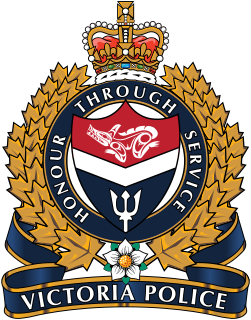
The Victoria Police Department (VicPD) is the municipal police force for the City of Victoria and the Township of Esquimalt, British Columbia, Canada. It is the oldest municipal police department in Canada west of the Great Lakes, the first Canadian law enforcement agency to deploy tasers and VicPD created the first digital forensic unit in the country. They are also one of the few police departments in Canada to use the G36 rifle.

The Metro Vancouver Transit Police (MVTP), previously the Greater Vancouver Transportation Authority Police Service and formally the South Coast British Columbia Transportation Authority Police Service (SCBCTAPS), is the police force for TransLink, the public transit system of the Metro Vancouver region of British Columbia, Canada.
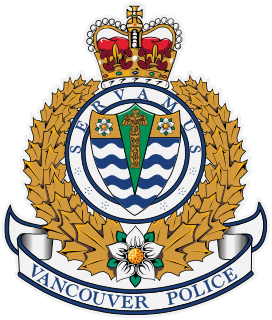
The Vancouver Police Department (VPD) is the police force for the City of Vancouver in British Columbia, Canada. It is one of several police departments within the Metro Vancouver Area and is the second largest police force in the province after RCMP "E" Division.
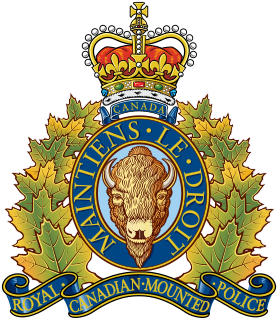
"E" Division is the division of the Royal Canadian Mounted Police in the province of British Columbia, Canada's westernmost province. It is the largest police body in the province, providing federal and provincial services throughout the province and policing all but 12 municipalities. In some urban areas, some municipalities have their own police forces while neighbouring ones contract with E Division. For example, Richmond is patrolled by E Division while neighbouring Vancouver has its own police force; both organizations contribute members and resources to various regional initiatives. E Division is the largest RCMP division, with 127 local detachments.

Rich Coleman is a politician and former police officer who served as a Member of the Legislative Assembly in British Columbia from 1996 to 2020, and is a former interim leader of the British Columbia Liberal Party. He was first elected in 1996 and re-elected in 2001, 2005, 2009, 2013 and 2017. Coleman represented the riding of Langley East.

The West Vancouver Police Department (WVPD) is the municipal police force for the district of West Vancouver, British Columbia, Canada.

The British Columbia Provincial Police (BCPP) was the provincial police service of British Columbia, Canada, between 1858 and 1950.

The Central Saanich Police Service is the police force for the district municipality of Central Saanich, British Columbia. Currently headed by Chief Constable Ian Lawson with 28 constables, five of whom are seconded to Combined Forces Special Enforcement Unit (CFSEU), regional crime unit, IRSU and the National Weapons Enforcement Support Team

The Delta Police Department (DPD) is the police force for the City of Delta, British Columbia, a suburban community in Metro Vancouver with a population of 102,661. As of 2019, the Delta Police Department has an authorized strength of 194 sworn members and 72 civilian support staff, and an operating budget of $35,981,000.

The Saanich Police Department is the police force for the District of Saanich, British Columbia led by Chief Constable Scott Green consisting of 181 sworn members, supported by 60 civilians and 50 volunteer reserve constables.

The British Columbia Sheriff Service (BCSS) is a provincial law enforcement agency overseen by the Ministry of the Attorney General in the province of British Columbia, Canada. Founded in 1857, it is the oldest law enforcement agency in the province. Sheriffs are Provincial Peace Officers appointed under the BC Sheriff Act and BC Police Act with authority to enforce all relevant federal and provincial acts including the criminal code throughout British Columbia while in the lawful execution of their duties.

This is a list of statistics in law enforcement in British Columbia in 2005, including crime rates, police strength, and police costs. In total there were 508,271 reported (non-traffic) incidents of Criminal Code offences, giving the province a crime rate of 120 offences per 1,000 people, the second highest in Canada. This was down 5% from 2004's rate of 125, and was the first decrease since 1999-2000. Of these crimes, only 22% were solved in the same year, including 52% of all violent crimes and 13% of all property crimes. This resulted in 57,817 persons being recommended for charges to the Crown counsel, of which 81% were male and 10% were young offenders.
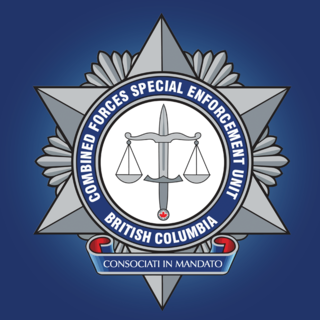
The Combined Forces Special Enforcement Unit – British Columbia (CFSEU-BC) was established in 2004 to facilitate the disruption and suppression of organized crime in BC and to support municipal police departments when public safety is deemed to be a priority. It is a part of the Royal Canadian Mounted Police (RCMP) "E" Division Federal Business Lines that is mandated to provide support and investigation into complex and diverse criminal activities in BC. It is modelled after other CFSEU units across the country and is currently staffed by RCMP officers and seconded officers from all 11 municipal police forces in British Columbia and Metro Vancouver Transit Police.
The Royal Canadian Mounted Police in Quebec, which is commonly referred to as "C" Division, plays a federal policing role in the Province of Quebec. Approximately 1,500 police officers, civilian members and public servants dedicate their efforts to a number of business lines, including financial integrity, national and border security, and organized crime enforcement. The RCMP in Quebec relies on dedicated resources to conduct investigations, provide VIP protective services and undertake crime prevention initiatives in communities in all areas of Quebec.
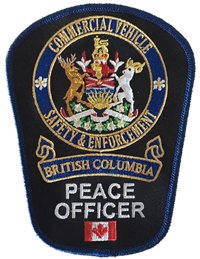
British Columbia Commercial Vehicle Safety & Enforcement (BCCVSE) is a provincial law enforcement agency that is responsible for the compliance and enforcement of the commercial transport sector, protection of the environment and transportation infrastructure of British Columbia, increasing road safety and protecting the motoring public.
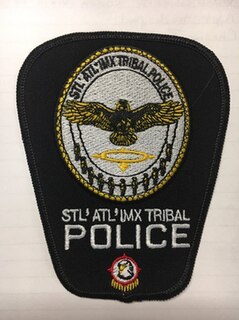
The Stlʼatlʼimx Tribal Police Service (STPS) is the police force for St'at'imc aboriginal peoples of British Columbia. The STPS is the only aboriginal police service in British Columbia. Their officers are appointed as designated provincial constables, and have full police powers on and off-duty throughout the province. They are based in Lillooet and Mount Currie.
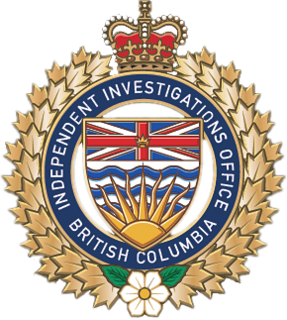
The Independent Investigations Office (IIO) is the civilian oversight agency in British Columbia, Canada responsible for examining and investigating incidents involving on or off duty municipal police officers, Stl’atl’imx Tribal Police Service, Metro Vancouver Transit Police, Royal Canadian Mounted Police officers based in BC, Special Provincial Constables, Special Municipal Constables and Auxiliary Constables that result in death or serious harm.
The 856 Gang is a gang active in the Northwest Territories and British Columbia area. The gang is named after a telephone prefix of Aldergrove, BC.
The Surrey Police Service (SPS) is a municipal police force currently proposed for the City of Surrey in British Columbia, Canada. It will be one of several police departments within the Metro Vancouver Area once the operations are handed over from Royal Canadian Mounted Police (RCMP) to SPS in 2022.
















